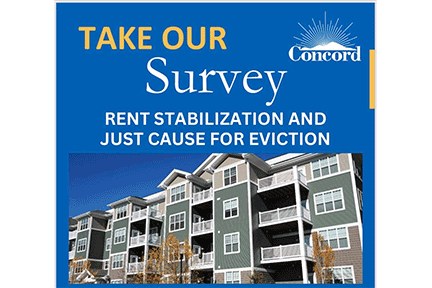The City of Concord announced that they are looking for feedback from property owner or tenants as they work on Rent Stabilization and Just Cause for Evictions.
Here is the notice:
Are you a property owner or tenant in Concord? The City of Concord has committed to the adoption of Rent Stabilization and Just Cause for Eviction Ordinances by December 31, 2023, and we’re seeking your input through our online survey (available in English and Spanish).
To assist us in drafting Rent Stabilization and Just Cause for Eviction policies, we are requesting that tenants and property owners complete these surveys by Sunday, Aug. 20, using the links below. A short presentation has also been included for your reference.
The feedback received from the surveys will be presented to the City Council for their consideration of the Rent Stabilization and Just Cause for Eviction ordinances at a public City Council meeting that is tentatively scheduled for Tuesday, Sept 5. Thank you for your feedback!
General information on Rent Stabilization and Just Cause for Eviction:
- Tenant Survey: click here
-
Property Owner Survey: click here
- More information: Click here
State Law
Tenant Protection Act (AB 1482)
- Signed into law October 13, 2019
- Annual rent increases are limited to the lower of 10%, or 5% + inflation, based on the local Consumer Price Index (CPI)
- Property owners are ensured a “fair return” on their property
- Property owners must provide a “just cause” reason when evicting a tenant
City of Concord Law
Residential Tenant Protection Program
- Effective August 2020, expires January 2030
- Follows the just causes for eviction under AB 1482 with additional protections:
- Greater relocation assistance for no-fault evictions of 2x monthly rent or $5,000, whichever is greater
- Property owners must offer minimum lease term of 12 or 6 months to new tenants
- Effective January 1, 2021, property owners must register and update unit and tenancy information on annual basis in a rent registry
What is Rent Stabilization?
Rent stabilization regulates rental housing prices to protect tenants from excessive rent increases while still allowing property owners to achieve a fair return.
The following slides provide a review of a handful of elements commonly seen in local rent stabilization ordinances that the City of Concord would like your input on. This is not an exhaustive list and your survey responses do not need to be limited to these topics. This review intended to just help get the conversation started.
Rent Increase Limit
The amount that property owners are allowed to increase tenants’ rents on an annual basis
- Rent increase limits vary by jurisdiction but may include a fixed limit, usually ranging from 2-8%, or may be indexed to the change in local CPI
- Some ordinances may establish a rent increase floor which is a minimum amount that rents can increase by
- This is intended to allow property owners to increase rents when CPI is 0 or negative
Rent Registry
- A database where property owners register rental properties and update rental unit and tenancy information, generally on an annual basis
- Rental registries allow tenants, property owners, and City staff to track relevant information on covered units
- The City of Concord has an existing rent registry which went into effect January 1, 2021:
- Applies to buildings with 4+ units
- FY 2023-24 fee is $5.25/ unit
- All units should be registered with HdL (rent registry administrators)
Rent Stabilization Administration Fee
- Property owners may be required to pay a fee that helps cover the costs of administering the rent stabilization and/or just cause program(s) including maintaining the rent registry, administration, and compliance
- Often referred to as the rent registry fee and collected when units are registered annually
- Fee structures vary by jurisdiction and can range from $20- $250/ unit
- A portion of the fee may be passed on to tenants
Previous Story
June 28, 2022: Concord Introduces Anti-Harassment Ordinance

